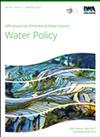Identifying determinants of sustainable water management at the household level through rainwater harvesting systems in Nepal
IF 1.8
4区 环境科学与生态学
Q4 WATER RESOURCES
引用次数: 3
Abstract
The urban water supply systems around the world are highly stressed at present due to growing water demand caused by rapid population growth and unplanned urbanization. The growing environmental awareness and water supply restrictions have made, rainwater harvesting systems (RWHS) a priority as well as a necessity in many countries. To improve urban water security, the practice of an RWHS is increasingly being adopted in the cities and towns of developing countries. This study aims at identifying the factors affecting the adoption of rainwater harvesting for household uses in the Kathmandu valley (KV) of Nepal. The results were drawn from a survey of 405 respondents who reside in the KV. To explain the determinants of adaptation, structural equation modeling (SEM) was used. Results show that independence for water access and system sophistication are significant for the adaptation of RWHS and relative advantage plays a moderating role that has partial mediation among dependent and independent variables with a significant relationship. Thus, variables like independence for water access, system sophistication, relative advantage and sustainable use should be highlighted for a sustainable supply of water. For this, we recommend effective policy interventions at the local and national level for the adoption of RWHS and its advantages in terms of safeguarding water in the long run at the present changing climate scenario.通过尼泊尔的雨水收集系统确定家庭一级可持续水管理的决定因素
由于人口快速增长和无计划的城市化导致的用水需求不断增加,目前世界各地的城市供水系统压力很大。在许多国家,日益增长的环境意识和供水限制使得雨水收集系统成为优先事项和必要条件。为了改善城市水安全,发展中国家的城市和城镇越来越多地采用了RWHS的做法。本研究旨在确定影响尼泊尔加德满都山谷(KV)家庭使用雨水收集的因素。该结果来自对居住在KV的405名受访者的调查。为了解释适应的决定因素,结构方程模型(SEM)被使用。结果表明,水源获取的独立性和系统复杂程度对生态系统的适应性具有显著影响,相对优势在因变量和自变量之间具有部分中介作用,且关系显著。因此,为了实现可持续的供水,应强调诸如取水的独立性、系统的复杂性、相对优势和可持续利用等变量。为此,我们建议在地方和国家层面采取有效的政策干预措施,以采用RWHS及其在当前气候变化情况下长期保护水资源方面的优势。
本文章由计算机程序翻译,如有差异,请以英文原文为准。
求助全文
约1分钟内获得全文
求助全文
来源期刊

Water Policy
环境科学-水资源
CiteScore
3.10
自引率
12.50%
发文量
81
审稿时长
6-12 weeks
期刊介绍:
Water Policy will publish reviews, research papers and progress reports in, among others, the following areas: financial, diplomatic, organizational, legal, administrative and research; organized by country, region or river basin. Water Policy also publishes reviews of books and grey literature.
 求助内容:
求助内容: 应助结果提醒方式:
应助结果提醒方式:


